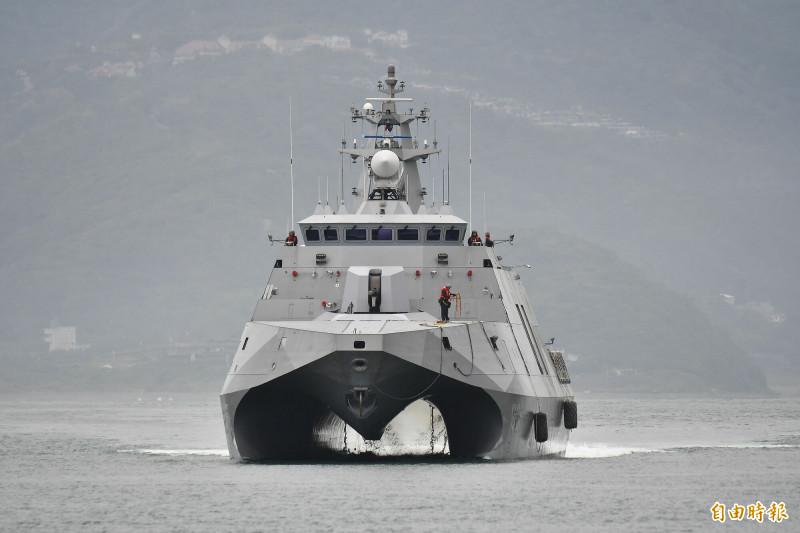The armed forces today conducted the second day of drills in the annual Han Kuang military exercises, featuring a live-fire tank firing exercise and a simulated invasion by Chinese warships.
In Hsinchu County, President William Lai (賴清德) visited the Kengzikou Range (坑子口訓練場) to monitor a live-fire exercise.
The exercise involved a platoon of M1A2T tanks Taiwan purchased from the US, which saw them practice firing individually, in pairs and as a full platoon.

Photo: Yu Tai-lang, Taipei Times
Following the drill, the Army said the tanks achieved perfect firing accuracy.
Lai praised the tanks’ performance and said that the more the armed forces train during peacetime, the more secure Taiwan would be and the more stable the region would remain.
The Navy’s anti-ship Littoral Combatant Command deployed several vessels to the north and south of Taiwan equipped with Hsiung Feng III missiles.
The command coordinated with Marine Corps units to deploy the missiles and set up camouflage, practicing their rapid response capabilities.
As more missiles are produced, along with more arms purchases of anti-ship missiles from the US, it is likely that the number of squadrons in the command would increase from the current number of 13.
For missiles on land, a source familiar with the armed forces’ plans said that the army would launch Patriot missiles from a public location in northern Taiwan this weekend.
The source said that although the location is not close to either Songshan Airport or Taoyuan Airport, the missiles’ full capability to prevent enemy attacks against key areas would be on display.
At 8am this morning, the Navy stationed two Tuo Chiang-class ships, the An Chiang (安江) and Ta Chiang (塔江艦) in Hualien where they are on standby monitoring Chinese naval movements to the east of Taiwan.
It is important to maintain monitoring capabilities to the east, defense officials said, adding that this is vital to verify the Coast Guard Administration’s ability to transition from peacetime to war operations.
Meanwhile, the Ministry of National Defense said that in the 24-hour period from 6am yesterday to 6am today, 12 Chinese military planes and seven vessels were detected around Taiwan and in the Taiwan Strait, with 10 of the planes crossing the median line.
Additional reporting by Aaron Tu and Yu Tai-lang

Taiwanese can file complaints with the Tourism Administration to report travel agencies if their activities caused termination of a person’s citizenship, Mainland Affairs Council Minister Chiu Chui-cheng (邱垂正) said yesterday, after a podcaster highlighted a case in which a person’s citizenship was canceled for receiving a single-use Chinese passport to enter Russia. The council is aware of incidents in which people who signed up through Chinese travel agencies for tours of Russia were told they could obtain Russian visas and fast-track border clearance, Chiu told reporters on the sidelines of an event in Taipei. However, the travel agencies actually applied

Japanese footwear brand Onitsuka Tiger today issued a public apology and said it has suspended an employee amid allegations that the staff member discriminated against a Vietnamese customer at its Taipei 101 store. Posting on the social media platform Threads yesterday, a user said that an employee at the store said that “those shoes are very expensive” when her friend, who is a migrant worker from Vietnam, asked for assistance. The employee then ignored her until she asked again, to which she replied: "We don't have a size 37." The post had amassed nearly 26,000 likes and 916 comments as of this

New measures aimed at making Taiwan more attractive to foreign professionals came into effect this month, the National Development Council said yesterday. Among the changes, international students at Taiwanese universities would be able to work in Taiwan without a work permit in the two years after they graduate, explainer materials provided by the council said. In addition, foreign nationals who graduated from one of the world’s top 200 universities within the past five years can also apply for a two-year open work permit. Previously, those graduates would have needed to apply for a work permit using point-based criteria or have a Taiwanese company

The Shilin District Prosecutors’ Office yesterday indicted two Taiwanese and issued a wanted notice for Pete Liu (劉作虎), founder of Shenzhen-based smartphone manufacturer OnePlus Technology Co (萬普拉斯科技), for allegedly contravening the Act Governing Relations Between the People of the Taiwan Area and the Mainland Area (臺灣地區與大陸地區人民關係條例) by poaching 70 engineers in Taiwan. Liu allegedly traveled to Taiwan at the end of 2014 and met with a Taiwanese man surnamed Lin (林) to discuss establishing a mobile software research and development (R&D) team in Taiwan, prosecutors said. Without approval from the government, Lin, following Liu’s instructions, recruited more than 70 software